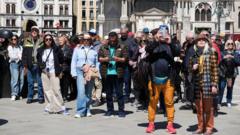Venice plans to extend its entrance fee scheme to 54 days in 2025 to deter overcrowding while preserving the city's historic charm.
**Venice Increases Tourist Entry Fee to Combat Overtourism by 2025**

**Venice Increases Tourist Entry Fee to Combat Overtourism by 2025**
New regulations aim to manage tourist flow as Venice addresses overtourism challenges.
In a bid to manage the relentless tide of tourists, Venice's mayor, Luigi Brugnaro, announced that the city will double the number of days it charges an entrance fee, extending the initiative through the summer of 2025. Following a "successful" trial period last year, the city aims to regulate visitor numbers to grant Venice the respect it deserves. Day visitors will be required to pay €5 (£4.17; $5.41) for entry on select days between April and July, with the fee increasing to €10 for last-minute bookings made less than four days in advance.
The initial fee structure was introduced in April of the previous year, targeting 29 days predominantly over weekends and public holidays. The updated fee strategy will apply every Friday through Sunday, plus public holidays, from 18 April until 27 July 2025—totaling 54 days.
To comply, visitors over the age of 14 will need to purchase tickets via their phones and present a QR code upon inspection, with random checks occurring at key arrival points, such as the train station. Those failing to display a valid ticket may face fines.
Exempt from the fee are visitors who have hotel or guest house reservations, along with residents of the Veneto region, university students, and anyone visiting relatives in the city.
Simone Venturini, a city councillor, emphasized Venice's proactive stance against overtourism, claiming it has transitioned from being heavily criticized for overcrowding to responding with innovative solutions. Initial figures reveal that during the first eight days of the 2024 trial, the city generated a sum equivalent to what had been anticipated for an entire three months. By mid-July, the total revenue from the entrance fees reached approximately €2.4 million (£2 million; $2.5 million).
However, Mayor Brugnaro is still assessing the financial viability of the scheme, especially given that the expenses surrounding the ticketing platform and promotional efforts have approached €3 million. Dissenting voices, such as opposition councillor Giovanni Andrea Martini, have labeled the fee initiative a “failure” for not successfully dispersing tourist traffic. The fee's hike from €5 to €10 is viewed as a move that could commercialize the city further, reducing it to little more than a museum experience.
These efforts come amid growing concerns from UNESCO, which has recommended listing Venice as a World Heritage site in danger due to the severe impacts of climate change and mass tourism. The city has already taken significant measures, such as banning large cruise ships from entering the historic center via the Giudecca canal following incidents that exacerbated pollution and structural erosion, highlighting the ongoing threat to Venice's unique heritage.
The initial fee structure was introduced in April of the previous year, targeting 29 days predominantly over weekends and public holidays. The updated fee strategy will apply every Friday through Sunday, plus public holidays, from 18 April until 27 July 2025—totaling 54 days.
To comply, visitors over the age of 14 will need to purchase tickets via their phones and present a QR code upon inspection, with random checks occurring at key arrival points, such as the train station. Those failing to display a valid ticket may face fines.
Exempt from the fee are visitors who have hotel or guest house reservations, along with residents of the Veneto region, university students, and anyone visiting relatives in the city.
Simone Venturini, a city councillor, emphasized Venice's proactive stance against overtourism, claiming it has transitioned from being heavily criticized for overcrowding to responding with innovative solutions. Initial figures reveal that during the first eight days of the 2024 trial, the city generated a sum equivalent to what had been anticipated for an entire three months. By mid-July, the total revenue from the entrance fees reached approximately €2.4 million (£2 million; $2.5 million).
However, Mayor Brugnaro is still assessing the financial viability of the scheme, especially given that the expenses surrounding the ticketing platform and promotional efforts have approached €3 million. Dissenting voices, such as opposition councillor Giovanni Andrea Martini, have labeled the fee initiative a “failure” for not successfully dispersing tourist traffic. The fee's hike from €5 to €10 is viewed as a move that could commercialize the city further, reducing it to little more than a museum experience.
These efforts come amid growing concerns from UNESCO, which has recommended listing Venice as a World Heritage site in danger due to the severe impacts of climate change and mass tourism. The city has already taken significant measures, such as banning large cruise ships from entering the historic center via the Giudecca canal following incidents that exacerbated pollution and structural erosion, highlighting the ongoing threat to Venice's unique heritage.





















